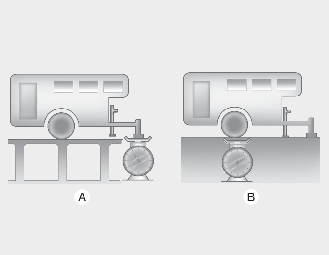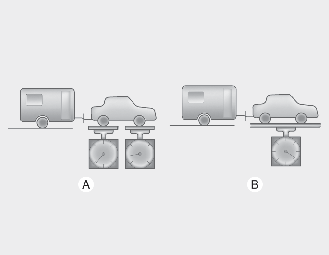If you do decide to pull a trailer
Here are some important points if you decide to pull a trailer:
-
Consider using a sway control. You can ask a hitch dealer about sway control.
-
Do not do any towing with your car during its first 2,000 km (1,200 miles) in order to allow the engine to properly break in. Failure to heed this caution may result in serious engine or transmission damage.
-
When towing a trailer, Kia recommends that you consult an authorised Kia dealer/service partner on additional requirements such as a towing kit, etc.
-
Always drive your vehicle at a moderate speed (less than 100 km/h (60 mph)).
-
On a long uphill grade, do not exceed 70 km/h (45 mph) or the posted towing speed limit, whichever is lower.
-
The chart contains important considerations that have to do with weight:
For Europe
|
Item |
Smartstream G1.0 T-GDi |
Smartstream G1.0 T-GDi MHEV |
Smartstream G1.2 |
|||
|---|---|---|---|---|---|---|
|
6M/T |
7DCT |
6M/T |
7DCT |
5M/T |
||
|
Maximum trailer weight / kg (Ibs.) |
Without brake System |
450 (992) |
450 (992) |
450 (992) |
450 (992) |
450 (992) |
|
With brake System |
1,110 (2,447) |
1,110 (2,447) |
700 (1,543) |
700 (1,543) |
510 (1,124) |
|
|
Maximum permissible static vertical load on the coupling device / kg (Ibs.) |
75 (165) |
|||||
|
Recommended distance from rear wheel centre to coupling point mm (inch) |
805 (31.7) |
|||||
For Australia
|
Item |
Smartstream G1.0 T-GDi |
|
|---|---|---|
|
7DCT |
||
|
Maximum trailer weight / kg (Ibs.) |
Without brake System |
450 (992) |
|
With brake System |
900 (1,984) |
|
|
Maximum permissible static vertical load on the coupling device / kg (Ibs.) |
75 (165) |
|
|
Recommended distance from rear wheel centre to coupling point / mm (inch) |
730 (29) |
|
Weight of the trailer

A : Tongue Load
B : Total Trailer Weight
What is the maximum safe weight of a trailer? It should never weigh more than the maximum trailer weight with trailer brakes. But even that can be too heavy.
It depends on how you plan to use your trailer. For example, speed, altitude, road grades, outside temperature and how often your vehicle is used to pull a trailer are all important. The ideal trailer weight can also depend on any special equipment that you have on your vehicle.
Weight of the trailer tongue

A : Gross Axle Weight
B : Gross Vehicle Weight
The tongue load of any trailer is an important weight to measure because it affects the total gross vehicle weight (GVW) of your vehicle. This weight includes the kerb weight of the vehicle, any cargo you may carry in it, and the people who will be riding in the vehicle. And if you tow a trailer, you must add the tongue load to the GVW because your vehicle will also be carrying that weight.
The trailer tongue should weigh a maximum of 10 % of the total loaded trailer weight, within the limits of the maximum trailer tongue load permissible.
After you've loaded your trailer, weigh the trailer and then the tongue, separately, to see if the weights are proper. If they aren’t, you may be able to correct them simply by moving some items around in the trailer.

Trailer
-
Never load a trailer with more weight in the rear than in the front. The front should be loaded with approximately 60% of the total trailer load; the rear should be loaded with approximately 40% of the total trailer load.
-
Never exceed the maximum weight limits of the trailer or trailer towing equipment. Improper loading can result in damage to your vehicle and/or personal injury. Check weights and loading at a commercial scale or highway patrol office equipped with scales.
-
An improperly loaded trailer can cause loss of vehicle control.